

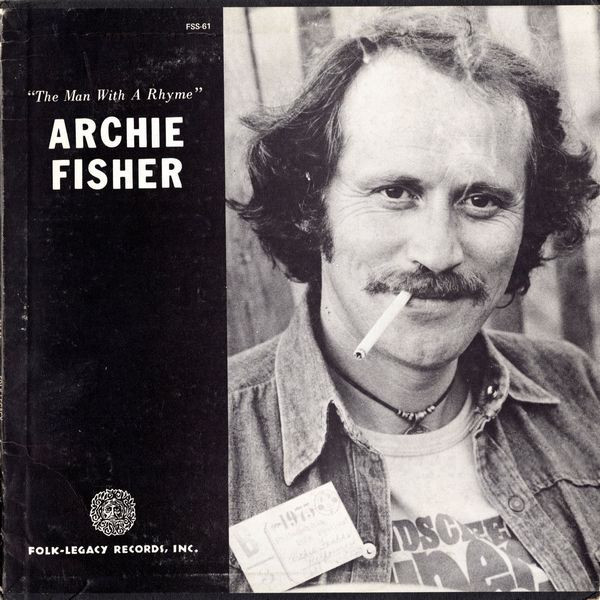 |
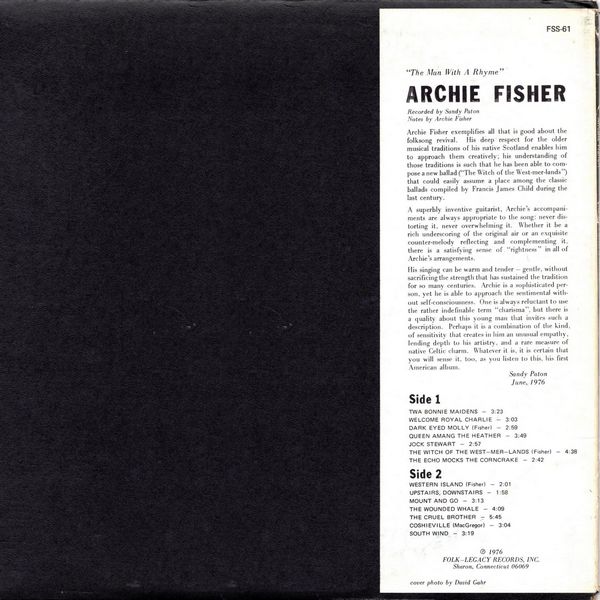
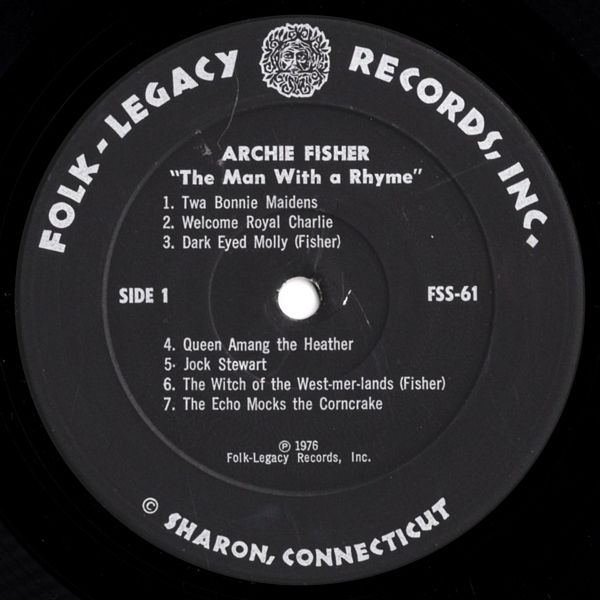
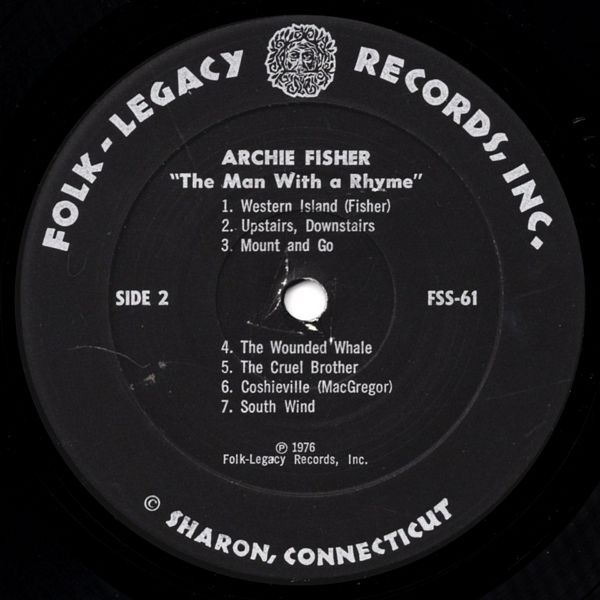
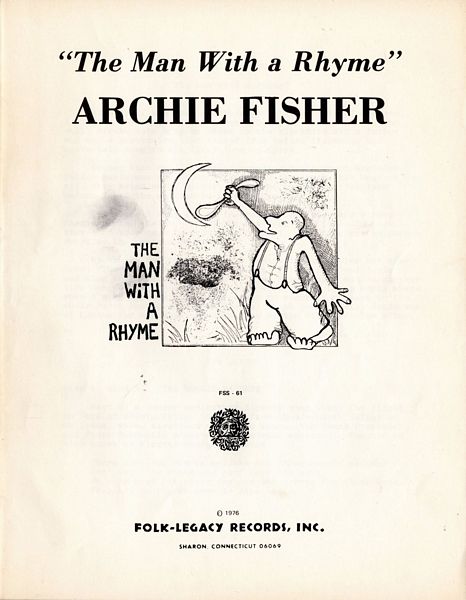
|
Sleeve Notes
Archie Fisher exemplifies all that is good about the folksong revival. His deep respect for the older musical traditions of his native Scotland enables him to approach them creatively; his understanding of those traditions is such that he has been able to compose a new ballad ("The Witch of the West-mer-lands") that could easily assume a place among the classic ballads compiled by Francis James Child during the last century.
A superbly inventive guitarist, Archie's accompaniments are always appropriate to the song: never distorting it, never overwhelming it. Whether it be a rich underscoring of the original air or an exquisite counter-melody reflecting and complementing it, there is a satisfying sense of "tightness" in all of Archie's arrangements.
His singing can be warm and tender — gentle, without sacrificing the strength that has sustained the tradition for so many centuries. Archie is a sophisticated person, yet he is able to approach the sentimental without self-consciousness. One is always reluctant to use the rather indefinable term "charisma", but there is a quality about this young man that invites such a description. Perhaps it is a combination of the kind, of sensitivity that creates in him an unusual empathy, lending depth to his artistry, and a rare measure of native Celtic charm. Whatever it is, it is certain that you will sense it, too, as you listen to this, his first American album.
Sandy Paton June, 1976
Although I was born an urban Scot in the city of Glasgow, I had two advantages in my parents being an island mother who still breaks into song as often as the blackbird and a father who had a repertoire that ranged from ballad fragments and music-hall song to his first love — opera.
To say that my six sisters acted as a catchment area for fellow musicians would not be far from the truth, but most of all, they acted as my private audience, and I sang for them before I had the courage to play before others.
The songs I sing are my interpretations of other singers' inspirations. Seldom have I taken a song from the cold page; they tend to come more from a warm heart. Now they are as much yours as they were ever mine.
My, thanks for their care and dedication go to (my new sisters) "The Ladies of the Lake": Wendy, Kathy, Lani and Annie, and also to Lorraine Lee, whom I think I must have met in another life somewhere. From now on, there will always be an empty space when I play the music they helped me to record. My love to the whole Paton household, and a special thank you to Kathy Henderson of London for her etching which gave me the title for the album.
Archie Fisher
The Songs:
Twa Bonnie Maidens — Part of a longer and rather flowery song about the flight to Skye of Bonnie Prince Charlie after the Jacobite defeat at Culloden, when, disguised as an old woman, the Young Pretender and Flora MacDonald deceived the redcoat sentries. The air is also known as Planxty George Brabazon.
Welcome Royal Charlie — I have a soft spot for the Chief Lochiel mentioned in this song, for the story goes that he talked Prince Charlie out of ransacking my native city of Glasgow when its burghers refused to supply the retreating Jacobite army with shoes and supplies. Charlie was not always as welcome in some places as this song implies. If he had been, the result of the '45 rebellion might have been very different.
Dark Eyed Molly (Copyright 1976, Eildon Music) — The compatibility of unrequited love and strong drink has Been the theme of many a traditional song. Speaking from experience, it doesn't help in the long run, but think of the songs we'd miss without the experiment. The melody is that of a Basque lullaby and the words are my reconstruction from a line or two of Gaelic poetry.
Queen Amang The Heather — A version of "Skippin' Barefoot Through the Heather" that I learned from Belle Stewart. Each variant of this song has its own charm in melody and text.
Jock Stewart — An Irish narrative ballad that has been shortened to an Aberdeenshire drinking song. Though I've searched the map of Eire in vain for a "River Kildare," and changed verse three so that the dog doesn't get shot, the song is essentially still Jeannie Robertson's version heard many years ago and reinspired by the singing of her daughter, Lizzie Higgins.
The Witch Of The West-Mer-Lands (Copyright 1976, Ard-Ri Music, Dublin) — I have borrowed, for this song, the form of the narrative ballad. The ingredients are a mixture of legend, superstition, and ballad themes brought into focus by the work of the Lakeland painter, Joni Turner. As far as I know, the female centaur is not a creature of mythology, and this role of witch disguise was suggested by the tales of antlered women with bodies of deer seen wading in the shallows of the lakes in the moonlight. There are many pleasant and hospitable inns in the Lake District.
The Echo Mocks the Corncrake — An Ayrshire love song that has more of the drawing room about it than the tradition. Unclaimed by Burns, the melody more than justifies its place in the Scottish folksinger's repertoire. I borrowed it from Geordie Hamilton of Edinburgh.
Western Island (Copyright 1976, Eildon Music) — A combination of partially fulfilled pipedreams. There's still time...
Upstairs and Downstairs — A song that puts very succinctly the penalties and shame incurred from the sowing of wild oats. Most versions, including this one, are from the Herd manuscripts.
Mount and Go — The Greig manuscript gave us one of the few songs where the woman comes off the better. In this case, she escapes from a fixed marriage with a rich sea Captain, apparently taking his ship as well as his gold.
The Wounded Whale — Collated from two versions in Gale Huntington's Songs the Whalermen Sang, taken from the logs of the Maria (1846) and the Uncas (1843). The melody is a filleted, Dundee-influenced hybrid. The song first came to my notice when I was browsing through Albe Dawson's library. I was very moved by the detailed and compassionate description of the kill, and borrowed the book so that I could just let the song sink in slowly over a period of time. Forgive the "lump in my throat" style of singing over the last few verses.
The Cruel Brother — Learned from the singing of a fine, young Aberdeenshire fiddler called Tam Spiers. This version was collated for me by Duncan McLellan of Inverness. It is mainly from Child 11, version C, with additions from other versions.
Coshieville (Copyright, S. MacGregor) — Stewart MacGregor was a poet, songwriter and novelist, and no mean singer and raconteur. He was there at the "beginning" in Edinburgh. His poetry was deeply rooted in our folksong, and the transition to songwriting enriched the repertoires of hist friends and, as time has shown, the music and literature of the country he so dearly loved. Coshieville is a hamlet not far from Aberfeldy which is known as "the Gateway to the Highlands." The song is set in the time of the building of our hydro-electric dams, an era that changed many parts of the West Highlands and the hearts of some of the girls the workers left behind.
South Wind — Composed by Donal O'Sullivan from the translation of the song by "a native of Irrul, County Mayo, named Domhnall Meir-geach Mac Con Mara (Freckled Donal Macnamara)" and published in O'Sullivan's Songs of the Irish (Crown, New York, 1960). Someone once told me that a singer remembers his last performance of the song, rather than the learned version. This is my only excuse for the odd variations in word and note. The printed text can be found in 0'Sullivan's book, where Seán Cannon started the whole process.